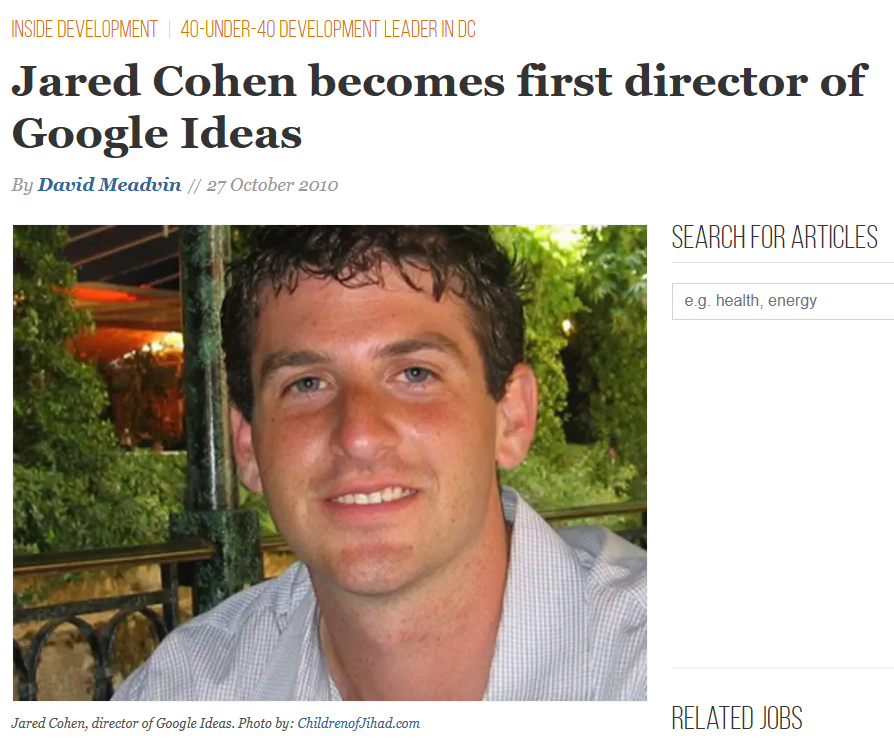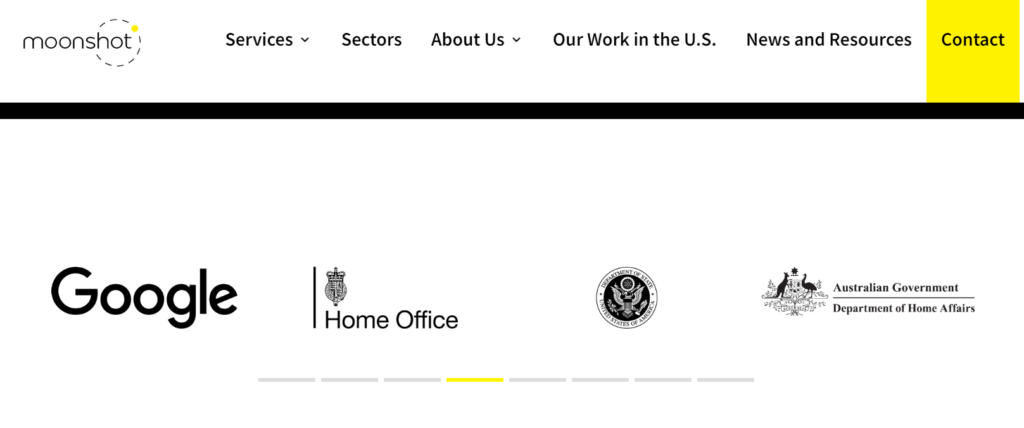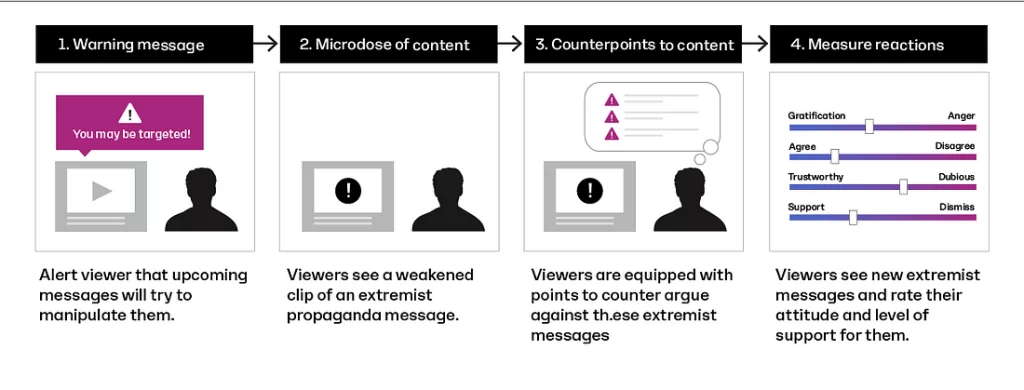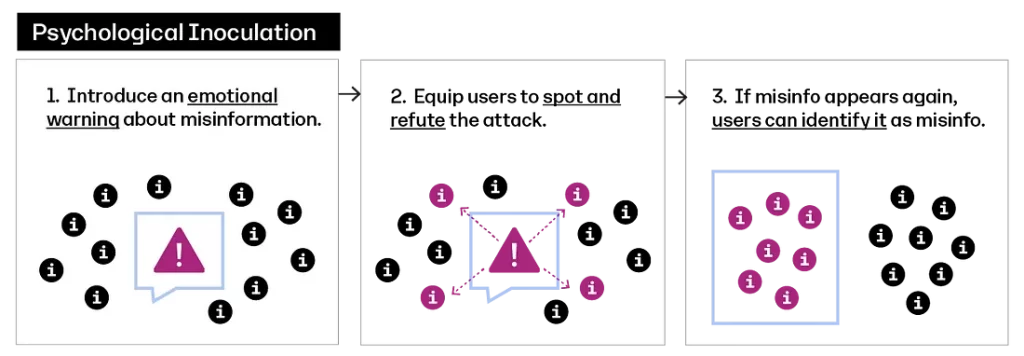
The concept of “prebunking” is gaining traction among censorship industry insiders, but its core mechanics are not widely understood by the public at large. A growing group of disinformation career professionals believe that prebunking’s use for “psychological inoculation,” or a “vaccine against misinformation,” can secure the perpetual dominance of official narratives. And they have Google, arguably the world’s most powerful technology company, on their side.
The easiest way to understand prebunking is as a form of systematic, weapons-grade strawmanning. Prebunking sessions involve exposing a subject to the weakest possible version of a dissident narrative (disinfo insiders call it feeding subjects a “microdose” of an argument), so that when people encounter the complete unfiltered version of the argument out in the wild, they are already conditioned against it.
Sander van der Linden, director of the Social Decision-Making Lab at Cambridge University, describes the technique as follows:
Prebunking, trying to preemptively protect people before [the] damage occurs, is much more effective than debunking. So what the media described as a psychological vaccine against fake news is really based on the psychological theory of inoculation. So just as injecting yourself with a weakened dose of a virus triggers the production of antibodies to help protect you from future infection you can do the same with information by preemptively injecting people with a severely weakened dose of fake news.
The United States government (and other western nations) are directly tied to the development of this psychological weapon. Van der Linden’s Social Decision-Making Lab, which has focused overwhelmingly on developing prebunking techniques, is partnered with Cybersecurity and Infrastructure Security Agency (CISA), the now-notorious censorship subagency of the Department of Homeland Security (DHS). The lab is also partnered with the UK’s Cabinet Office (to combat “COVID misinformation”) and the Foreign & Commonwealth Office, the country’s version of the State Department. American as well as British taxpayers are paying for the same psychological manipulation toolkit their governments hope to use against them.
This taxpayer-funded psychology research into opinion-shaping techniques is only one half of the picture. The censorship industry also requires mass distribution capacity, through major platforms, to spread these “psychological vaccines” to the widest possible audience. That’s where the Social Decision-Making Lab’s private sector partner, Google, comes into the frame – in particular, its “counter-extremism” unit, known as Jigsaw.
Google Jigsaw
From its very inception in 2010, when it went by the name Google Ideas, Jigsaw was inextricably tied to the U.S. government’s nascent interest in online psychological influence operations.
Its founding director was Jared Cohen, a man at the center of the government’s overseas regime change operations. He began his career in the Bush Administration in 2006, as an advisor to Secretary of State Condoleezza Rice. This was the height of the militant insurgency in Iraq, a period when the U.S. was desperate for new methods to counter anti-American sentiment abroad. One of a tiny number of Bush appointees retained by the Obama Administration, Cohen’s M.O. quickly became apparent – using Silicon Valley tech to achieve American foreign policy and intelligence objectives.
At the center of Cohen’s worldview was the notion that the big tech platforms were uniquely useful tools for swaying public opinion and mobilizing social movements to topple foreign regimes. This was why Cohen asked Twitter CEO Jack Dorsey in 2009 to keep the service online for Iranian protesters – he recognized that keeping the platform online and open to dissidents was critical to prolonging the unrest and potentially swaying the hotly contested 2009 Iranian election.

At the height of his success at the State Department kicking off the Arab Spring Facebook revolutions, Cohen left to join Google. Cohen’s social media rent-a-riot operations immediately transferred to the small one-man think tank housed within the tech giant – so much so that WikiLeaks founder Julian Assange branded him Google’s “director of regime change.” Assange was not being hyperbolic – his organization obtained leaked emails from Stratfor, complaining that Cohen and Google were intruding on their turf as private sector regime change experts.
In the emails, a Stratfor executive complained that Google was receiving support from the White House and State Department, and “doing things the CIA cannot do.” The executive hoped an international incident might “expose Google’s role in [fomenting] uprisings.”
FROM: burton@stratfor.com
TO: scott.stewart@stratfor.com, secure@stratfor.com
GOOGLE is getting WH and State Dept. support & air cover. In reality, they are doing things the CIA cannot do. But, I agree with you. He’s going to get himself kidnapped or killed. Might be the best thing to happen to expose GOOGLE’s covert role in foaming up-risings, to be blunt. The US Govt can then disavow knowledge and GOOGLE is left holding the shit bag.
—————————————————————————————————————–
scott stewart wrote:
Cohen might end up having an accident if he is not careful. This is not
child’s play.
—–Original Message—–
From: Fred Burton [mailto:burton@stratfor.com]
Sent: Sunday, February 27, 2011 9:28 AM
To: Secure List
Subject: GOOGLE & Iran ** internal use only – pls do not forward **
*** PLS DO NOT FORWARD — SOLE SOURCE
** Extracted from an internal email to a senior Google Executive. The msg is from Jared Cohen (the former policy appointee @ State) and discusses Cohen’s plans on meeting w/Iranians.
I wanted to follow-up and get a sense of your latest thinking on the proposed March trip to UAE, Azerbaijan, and Turkey. The purpose of this trip is to exclusively engage the Iranian community to better understand the challenges faced by Iranians as part of one of our Google Ideas groups on repressive societies.
Here is what we are thinking:
Drive to Azerbaijan/Iranian border and engage the Iranian communities closer to the border (this is important because we need the Azeri Iranian perspective)
Under Cohen, Jigsaw would become Google’s playground for psychological manipulation. The “think/do” tank, as Google described it, would develop machine learning tools to analyze and suppress online conversations. Initially called Conversation AI, and later Perspective, Cohen explained the tool as a method for detecting and reducing online “toxicity” and “trolling.” Here is a technology that, if the hype is to be believed, could detect, analyze and suppress global discussion trends, the development of which was overseen by a U.S. regime change expert – and it was presented to the public as a means to fight trolls.
Jigsaw also developed a tool called the “redirect method.” Launched in 2016, the redirect method was an early precursor to the toolkit now known as prebunking. The redirect method identifies when a user is searching for disfavored content, and automatically inserts search results intended to divert their attention to links or material that challenges or undermines the content they wanted to discover.
Again, the links to the western foreign policy and security state were clear from day one. Jigsaw developed the tool in collaboration with Moonshot CVE, a British company specializing in “anti-extremism” tech that has worked with DHS, the State Department, the UK’s Home Office, and Australia’s Department of Home Affairs.

Source: Moonshot CVE
Like so many other “counter-extremism” programs of the early 2010s, Google presented Jigsaw to the public as a way of combating America’s foreign foes, chiefly Islamic extremists. Wired described it as a “clever plan to stop aspiring ISIS recruits.” Initially, there was little to suggest that the technology would eventually be used on Americans – yet that is exactly what happened.
Within days of Donald Trump’s election victory in 2016, behind closed doors, Google executives branded Trump voters “extremists” and discussed using Jigsaw’s redirect method against them. Even before Trump’s election, Moonshot CVE’s co-founder was openly discussing the “far-right” in the U.S. as a “phase two” target of the redirect method. By 2021, it was clear the redirect method was being used against Americans – after Google was exposed for “redirecting” American users believed to be far-right to the opposite end of the spectrum: a far-left anarchist.
Jigsaw Embraces “Psychological Inoculation.”
In 2021, Jigsaw posted an article on Medium embracing “psychological inoculation” as an essential new technique to fight online extremism. Working with American University’s Polarization and Extremism Research Innovation Lab (PERIL), Google’s masters of mind-manipulation announced they had conducted research into the effects of prebunking.
These included basic warnings to users that the content they are about to consume contains misinformation, but also the more advanced “inoculation” technique described by Van der Linden, of presenting users with a strawmanned version of a disfavored argument.
As outlined in the diagram below, produced by Jigsaw, the method works by priming users to stay on their guard against manipulation, and to associate “extremist” messages with a deliberately-weakened “microdose” of the argument.

Source: Google Jigsaw
According to Jigsaw, the method was successful in altering users’ opinions, with “inoculated” users less likely to embrace the “extremist” ideology than non-inoculated users.
Our study offered promising results: We showed that people who watched the 3-min inoculation video were less likely to support scientific racism than people who were not inoculated. This included lower levels of willingness to provide ideological, financial, logistic, and armed support to violent extremists.
Additionally, after seeing an inoculation video, participants argued against the extremist positions more frequently and their perceptions of credibility of the propaganda sources diminished.
This study offers one way to improve how people engage with propaganda online, helping them become more thoughtful about their sources, form counterarguments against racist rhetoric, and more effectively resist disinformation.
Google also restricted its study to young white males, on the basis that these were most susceptible to “white supremacist messaging” Once again, we see Jigsaw’s shift of focus, from foreign adversaries to American citizens.
We recruited 800 participants (majority white males aged 18–35 years olds, a demographic frequently targeted by white supremacist messaging) and showed them a short video-based inoculation message that demonstrates rhetorical techniques common to scientific racism propaganda. Participants were then split into five groups, which were exposed to videos with varying degrees of subtlety for their extremist narratives — one with blatant extremism, another more subtle video, an even subtler meme, and a control video without any extremist narratives.
It’s no surprise that Jigsaw has pioneered the tip of the spear of prebunking. It’s a logical extension of its existing “redirect” method, providing a formula for the type of content users should be fed once they are redirected. Google also displays its intent to use this technology against domestic opponents.
Source: Google Jigsaw
This new utility belt of “prebunking” mindwar weapons is not to be underestimated. Research institutes and nonprofits as well as middleware companies like Moonshot have been diligently working to refine methods to control and manipulate public opinion. Those methods are then deployed by arguably the most influential and wide-reaching platform in the world: Google.
Having already used the “redirect method” against Americans, Google’s Jigsaw is now once again turning its attention abroad, deploying prebunking methods in India, the world’s largest democracy by population, as well as in Central and Eastern Europe. Jared Cohen’s vision of using Silicon Valley tech companies to further US foreign policy goals is coming together – but at what cost? At home and abroad, the disinformation industry’s alliance with the unaccountable power of Silicon Valley risks turning democracy into a puppet show, with shadowy intelligence agency intermediaries pulling the strings.
By Mike Benz







